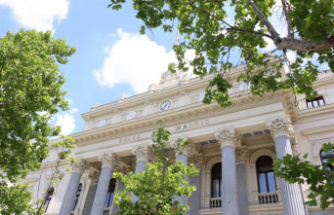The lament of the seal in Alaska, When men will live on love, Ordinary, Hymn to the beauty of the world, Do you love me? These songs are among the most beautiful in the Quebec repertoire. Unsurprisingly, they are at the top of our list of the 100 most beautiful songs in the history of Quebec.
• To read also: “A song is a miracle!”
• Read also: The songs that make me cry
The selection that you find in the Weekend section is the result of a great collaboration, that of sixteen journalists and columnists, local music specialists, linked to the Journal, the QMI Agency and QUB musique.
For this exercise, we used a simple method. Each of the sixteen members of the jury chose the 50 titles which, in their view, are the most significant of the Quebec repertoire. Then, we compiled the results and selected the first 100 titles from all of our jury's selections.
It is this work that we present to you today.
Our track record reflects the richness of music from here. Vigneault, Leclerc, Lévesque generated a varied and generous lineage: Charlebois and Dufresne, Fiori and Rivard, Reno and Dion, Bélanger and Moffatt, Koriass and Cœur de Pirate. Our list brings together their essential successes, but also unexpected gems.
We hope you enjoy this selection.
Good listening !
Danny VearDirector of Cahiers, Le Journal de Montréal
MONTREAL NEWSPAPER
THE NEWSPAPER OF QUEBEC
OLD MUSIQUE
AGENCE QMI
COLLABORATORS
Paul Piche
One of the greatest hits of the songwriter during the 1980s, this title with a nationalist flavor also stood out for one of its verses in Spanish. (Raphael Gendron-Martin)
Mara Tremblay
A country and folk piece, sweet and sad at the same time like the singular voice of its singer-songwriter Mara Tremblay. (Sarah-Emilie Nault)
Chicanery
Yes, their Calvary had us singing at the top of our voices in our cars, living rooms, and even karaoke. But I miss you always touches our hearts. (Bruno Lapointe)
Alaclair Ensemble
The most iconoclastic of our rappers have succeeded in expanding their audience with this earworm which opened the doors of the ADISQ Gala to them. (Cedric Belanger)
Claude Dubois
One of Dubois' oldest hits, J'ai Souvenir Encore particularly marks people's minds because of the rare use of the flute in Quebec popular song. (BC)
Daniel Belanger
Few are the broken hearts who did not shed tears and galls of disappointed love on this piece by Daniel Bélanger which quickly became a classic of Quebec song. (SEN)
Isabelle Boulay
Both the pen of Luc Plamondon and the voice of Isabelle Boulay are at their peak in I will forget you, I will forget you, an unforgettable ballad indeed. (BL)
John Leloup
Supported by a superb black and white music video, the uplifting Isabelle is directly inspired by the Latin-influenced rock/punk/ska practiced by the Frenchman Manu Chao. (BC)
Ariane Moffatt
Ariane Moffatt sings loud and clear that you can have a great need to be loved without it being a sign of weakness. (SEN)
Michel Pagliaro
Huge success of our national Pag, I hear knocking would be the best-selling 45 rpm in the history of music in Quebec. A home run. (Yves Leclerc)
Marc Hamilton
Written during a stay in Montpellier, France, this huge love song has been translated into 15 languages, covered by several artists and a success in 70 countries with eight million copies sold. (YL)
Location Locass
Jean Charest's government had barely been elected when the most popular rap trio of the time launched into this enjoyable charge at full speed. (BC)
Daniel Belanger
This is the perfect example of a song with a timeless message, here that of the guy who isolates himself from the life that revolves around his navel, of which Daniel Bélanger has the secret. (BC)
Ariane Moffatt
"I'm coming back to Montreal, my head swollen with clouds," sings Ariane Moffatt on this joyful piece that has become an anthem for travelers returning to Quebec. (SEN)
The Classels
It was with Avant de me dire adieu that Les Classels became legendary. And even after all these years, we will never be ready to say goodbye to them. (BL)
Pirate's heart
A key piece in the work of Béatrice Martin, her soft piano and her words on a complicated love situation are enough to tear tears away. (RGM)
Mitsou
Bye bye mon cowboy is remembered as much for its irresistible and catchy pop melody as for its music video which made Mitsou a sex symbol. (BC)
pull the coyote
It is in a very unique and poetic way that Benoît Pinette approached the illness of a friend. A colorful pen that goes straight to the heart. (RGM)
Marie Carmen
A revival of Barbara's 1970 play, L'aigle noir by Marie Carmen (1992) left its mark on an entire generation. It is still sung with great conviction at karaoke nights. (SEN)
John Leloup
"Come on, a little sincerity / The world is crying" launches John The Wolf on this dynamic song from the album Le dôme which has not aged a bit. (RGM)
Laurence Jalbert
A sad reminder of the ravages of violence against women, this anthem remains timeless – and sadly relevant – even nearly 30 years later. (BL)
Francine Raymond
Second entry of this exceptional singer-songwriter, the heartbreaking For the love that we have left is a little-known treasure of the song here. (BC)
With no helmet
In cinema or in music, Stéphane Lafleur has established himself as one of our most beautiful feathers and this indie folk anthem is irrefutable proof of that. (BC)
Claude Gauthier
Popularized by Charlebois in 1967, this winter song was written with Claude Gauthier, at his home, on Christmas Eve in 1964. Recorded by Claude Gauthier, it was then covered by Charlebois. (YL)
Renee Claude
Renée Claude announced in 1970 the "beginning of a new era". And it was carried by his divine voice that it was inaugurated in good and due form. (BL)
Harmonium
Launched by acoustic guitar sounds and the unique voice of Fiori, this piece that allowed Harmonium to take flight and establish itself immediately in the history of Quebec music. (YL)
The Three Agreements
This piece with more than original lyrics and style introduced us to the trio from Drummondville with their festive sound and delicious absurd humor. (SEN)
Nathalie Simard
Written in 1984 for the dramatic finale of Conte pour tous La guerre des tuques – oh no, not Cléo! –, this song capsized more than a generation. (RGM)
Black Ball
“To love with love is to love like me, I love you,” sang Georges Thurston dit Boule Noire, one of the rare symbols of disco-funk in Quebec who died in 2007. (SEN)
Sylvain Lelievre
A “jazzy” song about small quiet pleasures that cost nothing, the poet from Limoilou offers beautiful images of all those things that make you want to dream and sing. (YL)
Daniel Boucher
“My sick gang, where are you? asked the eccentric Daniel Boucher to Quebecers who did not hesitate to embark on his madness by reproducing the choreography of La désise. (SEN)
Mario Pelchat
From the first notes, we recognize this piece from 1993, which has become a true classic, highlighting the powerful voice of Mario Pelchat. (SEN)
Luc De Larochelliere
Luc De Larochellière had flair when he wrote this great song, which revealed it. A text that is fair, powerful and still relevant. (YL)
Julie Masse
"Your departure hurt me like a knife in the skin", sang Julie Masse, expressing all the pain of losing the loved one. (SEN)
Claude Dubois
The young Claude Dubois whistled this piece when he had long hair, he wore sequins and he already had the powerful voice that we know him. (SEN)
Dan Bigras
Long hair, hoarse voice and intense performer, Dan Bigras presented himself to Quebecers with this piece written by Frank Langolff, with lyrics as eloquent as his talent. (SEN)
Laurence Jalbert
Remaining in first place on the French-language radio charts for seven weeks, this piece from the second album by the singer-songwriter confirmed her place among the great artists of her generation. (RGM)
Keith Kouna
Best known for his caustic punk rock projects, Keith Kouna moved to tears as he addressed his deceased father while accompanying himself on an acoustic guitar. (BC)
Nicole Martin
Written by Stéphane Venne, theme song of the film Les Plouffe and performed with exquisite abandon, this title is Nicole Martin's greatest success. (BC)
The Boulay sisters
An impossible love song, often recognized as a lesbian anthem, in 2013 she put this friendly duo of Gaspé sisters "on the map". (RGM)
Richard Desjardins
“Higher, higher / The heart is a bird. Desjardins makes us vibrate here in this poignant hymn to freedom. (RGM)
Roch Neighbor
A guitar and a heartbreak: at the turn of the 1990s, the success of the ballad Hélène triggered a Voisinemania in Quebec and France. (BC)
My ancestors
Degenerations is an atypical success. Without refrain and on a simple percussive crescendo rhythm, this composition by Stéphane Archambault has achieved the feat of rallying... several generations. (BC)
Ginette Reno
Written by Jean-Pierre Ferland in 1969, Un peu plus haut is one of the mythical songs of the Quebec repertoire. We will long remember the performance of the trio Reno, Ferland and Dion during the celebrations of the 400th anniversary of Quebec in 2008. (SEN)
Hubert Lenoir
No need to try to deny it: we all swayed on Fille de personne II, the biggest hit of the year 2018. (BL)
The BB
If we could shout to the sky... we would certainly try to tell Patrick Bourgeois how much you will never know continues to live with us today. (BL)
Francine Raymond
This superb song, which features the ethereal voice of Francine Raymond, has not aged. Always effective, with a huge chorus, it transports us elsewhere and into another world. (YL)
Michel Louvain
We already loved this guilty pleasure song; it touches our hearts even more since the departure of the singer with the velvet voice in April 2021. (SEN)
Jean-Pierre Ferland
Found on Yellow, Ferland's masterpiece, this piece is considered by many to be his finest. Even Charlotte Gainsbourg took it over, per Beck's suggestion. (RGM)
Roommates
Huge Roommates song, Get out of there, it sounds like a ton of bricks. A unifying chorus with the voices of the Diouf brothers and a hellish rhythm, it's still very good to listen to 24 years after its creation. (YL)
Harmonium
A classic of Harmonium and campfires, this title, composed by Serge Fiori, with its progressive rock instrumental portion, remains a staple of Quebec music. The chorus, at the end of the piece, is sung by a dozen passers-by picked up one fine Saturday among the fauna of rue Sainte-Catherine. (YL)
Plume Latraverse
La Bobépine de Plume, which perfumes itself with turpentine and which runs the rue Sainte-Catherine with its boots, is an explosive song. Big square rock at the start, followed by a psychedelic passage, it becomes a kind of blues, to end with a guitar solo and a loud cry. (YL)
Felix Leclerc
Me, my shoes is one of the first songs by Félix that comes to our ears when we think of the poet from La Tuque. With this song, Félix, who lived on the island of Orléans, will be one of the first Quebec artists to achieve success in France. Which will lead him to become popular in his hometown. (YL)
Marie Carmen
After the gigantic success of the cover L'aigle noir, Marie Carmen would again reach the first position of the French-speaking Quebec charts with Entre l'ombre et la lumière, in 1992. She will stay there for five weeks with this piece which marked her career. . (SEN)
Patrick Normand
"If you think love has let you down again..." Patrick Norman knows how to breathe hope into each of our heartaches with When we are in love. He alone knows how to make us smile by reminding us that “the sun always comes after rainy days. (BL)
Gerry Boulet
Three years after the separation from Offenbach and suffering from cancer, Gerry Boulet surprises with the variety of songs on his second solo album Rendez-vous douce. On Still Alive, with lyrics written by Michel Rivard, Gerry faces his destiny with combativeness and strikes in life with great blows of love. (YL)
Richard Seguin
Song written on the road, during the tour of the album Double Vie, Journée d’Amérique deals with the daily lives of men who are struggling. Séguin abandons the sounds of synths and reconnects with folk rock. An album and a song that would become hits and give new impetus to his career. (YL)
Pierre Lapointe
A festive piece par excellence in the repertoire of the author-composer, it has nevertheless quite dramatic origins. To write it, Lapointe had mentioned in an interview that he was inspired by the patriotic songs of the Soviet Union of the 1960s as well as the tunes that Japanese suicide bombers sang while drinking their poison before going to kill themselves! (RGM)
Ginette Reno
There is a moment, during Ginette Reno's shows, which is worth the price of the ticket. For the last repetition of the chorus of Je ne suis qu'une chanson, a title written by Diane Juster, the singer lowers her microphone and, in her powerful voice alone, reminds us that she has just made love to us as best she can. Grand! (BC)
Marjo
It's hard not to be moved by the great rocker who reveals here a more tender facet of her talent. The raw emotion, the voice of a Marjo at the top of her game, the heartbreaking text... it's all there. A gentle and vulnerable ballad that has nothing to envy to its Provocante and other Wild Cats. (BL)
Paul Piche
Paul Piché's talent as a storyteller has never been better showcased than with L'Escalier, an anthem without refrain that we have enjoyed humming for more than 40 years. Candidate for Song of the Year at the 1980 ADISQ gala, this success was at the time bowed to Je ne suis qu'une chanson, by Diane Juster. (BL)
Karim Ouellet
Engaging, soaring and, above all, unforgettable. Love is probably the greatest legacy left by the singer-songwriter who left us much, much too soon this year. He will have marked us forever with his sense of rhythm, rhyme, and his divine poetry. (BL)
Georges Dor
In a Quebec champion of hydroelectricity, La Manic recalls how much loneliness weighed heavily on the workers who built our large dams. The success of La Manic is very much due to the artistic choice of Georges Dor to draw inspiration from a letter from a worker to his beloved. The result is as intimate as it is universal. (BC)
Clemence Desrochers
The great comic wrote this song and presented it on the album De la factrie au jardin released in 2003. "This summer I will make a garden, If you want to stay with me, A few more months, It will be small, is certain, I will take good care of it, So that it is as beautiful as you”, she sings there. (SEN)
Willie Lamothe
Adapted from a song by Ontarian Greg Joly, Mille après mille is a landmark song of country music, which was called, at one time, western. Classic, Willie Lamothe's version has been taken up by many artists. As a duo, by Céline Dion and Fred Pellerin, by Isabelle Boulay, by Roch Voisine and Plume Latraverse. (YL)
Felix Leclerc
A precursor, the father of Quebec song already sang of love for his homeland, his territory and the Earth that we must protect, while the themes of the environment and identity were new challenges for the Quebecois. (SEN)
Felix Leclerc
Félix Leclerc's best-known song, recorded on an album that included Moi, mes souliers. Singer Dalida slightly modified the lyrics when she covered it in 1976. Since then, many artists, including rockers Groovy Aardvark, have appropriated this hit by the singer who died in 1988. (SEN)
Daniel Belanger
"If one of these four had to / My soul disperses..." Bélanger approaches mental problems with accuracy and sensitivity. Alone on the guitar, he delivers one of his most touching songs in his career. Thirty years later, the piece is still cherished by concert audiences. (RGM)
Daniel Lavoie
Taken from the album Attention Attention, this bittersweet piece was written by Daniel Lavoie when he had just seen on television a couple of teenagers walking in the rubble of Beirut. “They love each other as before, Before threats and great torments,” he was inspired to write, contrasting the atrocities of war with the beauty of vulnerable adolescent love. (SEN)
Ginette Reno
This great song, written by Charles Aznavour for Ginette Reno, quickly became a classic of Quebec song. “The main thing is to be loved”, she sings with power and conviction since 1991. This piece will have punctuated important events on our cultural scene, in particular during the funeral of Guy Lafleur on April 22.
Celine Dion
Whenever we realize that "the world is run by madmen", that the planet screams its suffering, buried by the noise of wars and conflicts, we must remember that, despite everything, love still exists. And who better than Celine Dion to do it. “Beyond violence / Beyond madness / Despite falling bombs / Around the world”, these are words that sadly still remain relevant. (BL)
Offenbach
Flagship song of Offenbach's repertoire, the text by Pierre Huet, written in a chalet in the Laurentians, sung by Breen Leboeuf, which tells the blues of a guy who no longer wants to leave his apartment, is particularly captivating and colorful. . Like during this passage where the man wonders if Drogue-secours delivers illicit substances. This title, which can be found on the album Traversion, has always been a must and a highlight of the shows of the Quebec formation. (YL)
Michel Rivard
After the immense success of Beau Dommage, Michel Rivard brilliantly pursued a solo career. On his fifth album, A Hole in the Clouds, the songwriter delivered what would become one of his most beloved and timeless songs. "I would like to see the sea / And dance with it / To defy death", he sang on this hovering piece that gives us the taste to take to the open sea. (RGM)
Fabienne Thibeault
"My head is bursting..." These five words alone are enough to bring Fabienne Thibeault's crystalline, even ethereal voice to mind. Since taken over by half of the directory of the Union des artistes (we're hardly exaggerating!), Le monde est stone is forever engraved in the rock of our collective imagination, certainly evoking all the pain and despair of Marie- Jeanne, unforgettable automaton waitress from the rock opera Starmania. (BL)
Celine Dion
Another pearl born from the meeting of Celine Dion and Jean-Jacques Goldman, who only needs a few notes to move. The sober interpretation, all in nuances of the diva comes to resonate the words with even more power than all the artifices could do. She deploys the full extent of her immense talent, recalling, in the end, that love is often the simplest of solutions. (BL)
Celine Dion
Celine Dion instantly came to seek our souls “in the cold, in the flames” thanks to the pen of Jean-Jacques Goldman. Cornerstone of the repertoire of Charlemagne's diva, Pour que tu m'aime encore transcends language barriers, and has since been part of her concert program all over the world. She promised to "cast a spell" on us. And it's well done, because even nearly 30 years later, we still obviously love it. (BL)
Claude Leveille
By setting the nostalgia of a happy childhood to music, Claude Léveillé bequeathed to the Francophonie a hymn that has stood the test of time. Even today, Frédéric's piano chords are recognizable among a thousand. Adapted, Frédéric's tune was even briefly used to sell a fast-food chain's hamburgers in a popular 1988 TV commercial. Written for his brother Jean, the song took Frédéric's title for the sake of having a three-syllable title. (BC)
Vincent Vallieres
Vincent Vallières has succeeded in encapsulating the infinite beauty of daily acts, sometimes banal, but always imbued with tenderness with On va s'aimer encore. It didn't take long to make it the love anthem of the new millennium. After all, what could be more beautiful than a couple who "will love each other again", "through good times, through setbacks, in life, in death"? Nothing, of course. (BL)
The Dashing Cowboys
Since the beginning of Les Cowboys Fringants, the group’s lyricist and composer, Jean-François Pauzé, has cultivated the art of translating the spirit of the times into song. With America is crying, he has outdone himself. After the election of Donald Trump, in an increasingly divided world, the rhythmic harmonica poetry of this immense radio hit touched Quebecers in the heart. There may not be much love left in the soup du jour, but between the Cowboys and the public there has never been so much. (BC)
Diane Tell
Diane Tell performed this song, written between Montreal and New York, during her participation in the Festival de la chanson française in Spa, Belgium, in 1980. Success in Quebec, Félix for song of the year in 1981, Si j was a man is shunned by French radio stations. It will become a huge success on the waves of the new private French station NRJ in 1982. This will lead it to settle in Europe. (YL)
Raven
Singer Marjolène Morin, alias Marjo, joined the group Corbeau in 1979 and was part of it for five years. Title track of the album released in 1981, Illégal was one of the group's greatest hits. Written by Marjo, the rock song carved out a place both in the hearts of Quebecers who know its lyrics by heart and in the industry, which awarded the group various awards, including the trophy for best song in 1983. (SEN)
Nice pity
We would recognize this Quebec song that has become cult among a thousand simply by hearing its first chords! Extracted from the album Where is passed the wedding, released in 1975 by Beau Dommage, the song written by Michel Rivard and Pierre Huet recounts, with a nostalgia sometimes happy sometimes cynical, the time of the Expo and the "flower power". . This song about passing time and people who, like places, change continues to resonate – 40 years later – in our realities. (SEN)
Claude Dubois
Shocking, If God Exists “Evokes that moment when people feel that their strength is abandoning them, that they are knocking on the door of death,” explained its creator and performer to Radio-Canada a few years ago. Its comforting message and the exceptionally sensitive interpretation of Claude Dubois (this vocal rise in the chorus is nothing short of sublime) have made it one of the most popular mourning songs in Quebec. (BC)
Jean-Pierre Ferland
"A chance that I have you, I have you, you have me, a chance that we have" sings the great Jean-Pierre Ferland for more than two decades. If the singer, now 87 years old, has already confessed to having written this magnificent piece for... a cat, the fact remains that thousands of Quebecers and members of the Francophonie have been – and are always – turned upside down by the depth of the artist's words and interpretation on this piece filled with vulnerability repeated many times by artists from here, including Céline Dion. (SEN)
Yvon Deschamps
Written in 1970 by Yvon Deschamps to accompany his monologue, Le P’tit Jesus, this poignant song, composed by Jacques Perron, has gone through the ages, being inducted into the Canadian Songwriters Hall of Fame in 2019. More than fifty years later, this ode to love and peace is still as topical as ever. "Two thousand years of hate / Haven't changed anything in love / To break our chains / Sound guns and drums. (RGM)
The Dashing Cowboys
Hyper nostalgic, this piece from the group from Repentigny struck a chord with thousands of chicks and chicks with its references to Passe-Partout and a childhood where everything seemed simpler.
"After having existed to save time / We will say to ourselves that we were finally only shooting stars", wrote the lyricist Jean-François Pauzé in this very beautiful song which sends the message of enjoying life while it is. is still time. (RGM)
Harmonium
For a Moment may not be the biggest and best song on Harmonium's debut album, but it is certainly the most significant. Launched on 45 rpm, Pour un moment became the biggest commercial success of the trio.
It will even be adapted in symphonic mode, 46 years later, on the opus Histoires sans mots – Harmonium symphonique. It can also be heard in an alternate version on the Harmonium XLV reissue with a harmonica solo.
Composed by Serge Fiori and Michel Normandeau, to lyrics by the latter, Pour un moment is taken up, in French, by the Canadian artist Gowan, when he comes to give performances in Quebec. (YL)
Jean-Pierre Ferland
Title that opens the classic Yellow, a landmark album of Quebec song, Le Petit Roi tells the story of Boule de Gum, transformed and who becomes a man.
Composed with Michel Robidoux, guitarist for Robert Charlebois, Le Petit Roi propels Ferland into a completely different musical dimension, more complex and more elaborate.
Among the musicians who worked on this album and on this piece, we find the guitarist David Spinozza, who will work with Paul and Linda McCartney and Paul Simon, and the virtuoso bassist Tony Levin who was part of King Crimson and who played with Peter Gabriel. (YL)
Daniel Belanger
In the fall of 2001, when we were barely recovering from the collapse of the World Trade Center towers, Daniel Bélanger arrived with the feel-good album par excellence, Rêver mieux.
The luminous title-track then acted like a balm on our somewhat battered hearts. "You only asked for a shoulder / To lean on my bed / In your bruises. »
More than twenty years later, the piece is still as effective.
To think that Bélanger has already admitted in an interview to having originally written this piece for the model Ève Salvail, who had refused it! The musician then decided to keep it for his own album, a wise choice. (RGM)
Gilles Vigneault
Yvon Deschamps and Louise Forestier challenged Gilles Vigneault. That of writing a song to replace the traditional Happy Birthday.
Performing it for the first time on June 24, 1975, on Mount Royal, on the occasion of the national holiday, the author, composer and performer from Natashquan more than succeeded in his mission.
The song, with altered lyrics, has become a staple at birthday parties. It has also become an anthem associated with the sovereignist movement. Gens du pays is considered by many to be the anthem of Quebec. This song, which can be found on the opus J'ai planté un cerf... is an immortal of the Quebec repertoire. (YL)
Luc De Larochelliere
“Because life is so fragile,” sang De Larochellière in this song from 1990, which has now become a classic of Quebec song.
In an interview two years ago, the songwriter spoke of Si fragile as follows: “People have appropriated it in their lives and it is often sung at funerals, to accompany this kind of passage. It is anchored in the hearts and memories of many people, and I am proud of it. (RGM)
Claude Dubois
This story of a businessman who "would have liked to be an artiiiiiiste" resonated strongly in the French-speaking world when it was released, as part of the legendary musical show Starmania, in 1978.
"Since I have a sense of business / I succeeded and I'm proud of it / Deep down I have only one regret / I'm not doing what I would have liked to do", sang Claude Dubois in the original version which has since been covered by countless performers.
Written by Luc Plamondon and composed by Michel Berger, this piece is one of the most striking and timeless that the duo of Franco-Quebec creators will have produced. (RGM)
Jean Leloup and the Dirty Affair
"Ladies and gentlemen, watch out, I'm going to make a song for you..." In 1991, after a decade of the 1980s that left them hungry, all young Quebecers fell in love with local music again thanks to this stunning anthem antiwar. Originally a rock song, 1990 turned into a disco hit under the influence of James Di Salvio before ending up on the reissue of the classic album Love Is Without Pity. The success is dazzling. As Charlebois had done with Lindberg, 1990 brought Quebec song into a new modernity and the iconoclast Leloup became the hero of an entire generation. (BC)
Diane Dufresne
Thanks to a statement as grand and powerful as its interpreter, the Hymn to the beauty of the world has crossed the ages, taking on different meanings over the years. But what remains, what touches above all, is the masterful interpretation that Diane Dufresne once made of it. "Let us make the earth a great garden for those who will come after us", this is a message that has not taken the slightest wrinkle, and to which we should return more often. And we tend to forget all the tragedy at the origin of this song: Luc Plamondon took over the last words of the poetess Huguette Gaulin, pronounced just before she set herself on fire in Montreal, in 1972. Poignant, you say? (BL)
Roommates
Released in 1998, on the album Dehors Novembre, this piece took on a heartbreaking meaning barely two years later, after singer Dédé Fortin took his own life.
"It's because of my answering machine / There's absolutely nothing about the cassette / I'm telling you that tonight, in my little heart / There's a problem" sang the leader of Les Colocs in this poignant song on the loneliness that ruined his life.
One can only acquiesce when hearing the artist invaded by a malaise launch this now famous phrase imbued with wisdom: "Life is short, but it's long little bits". (RGM)
Robert Charlebois
It is certainly a tad masochistic on the part of a group of journalists to raise to fifth place on such a list a song that reduces us to the simple status of "nice failures". Our lack of resentment is explained. After that of the seal in Alaska, Ordinaire is certainly the most beautiful and moving lament in the entire Quebec repertoire. On a remarkable text by his girlfriend at the time, Mouffe, Robert Charlebois exposes in a superb dramatic rise the torments of a popular artist. The piece is autobiographical since he is recovering from a record failure that leaves him pensive. It is also a look of a rare lucidity on the other side of the medal of a profession, that of artist, less glamorous than the public can imagine. Ordinary also allows Robert Charlebois, whose impact on the local music scene will undoubtedly be felt for decades, to be the only artist to place two titles in our top 5. It's anything but ordinary . (BC)
Richard Desjardins
It took Richard Desjardins to succeed in writing one of the most beautiful love songs by slipping into it a "dare-devil Nefertiti" and a cleaning lady who wants to "change character". And it is probably this singularity – in addition to its potential for perilous vocal flights – that makes its Tu m'aimes-tu a timeless juggernaut of Quebec song that has crossed the ages, marking each of the generations that came after. The genius of the singer-songwriter takes on all its grandeur, all its sublime, with his skillful and colorful pen. No doubt possible, this is a song that is indeed “so, so, so beautiful”. The album to which she gives her name was also awarded three Félix awards at the 1991 ADISQ gala, including those for songwriter and popular album of the year. (BL)
Robert Charlebois and Louise Forestier
During the effervescent 1960s, when the Beatles exploded the codes of pop music on the international scene, Robert Charlebois took off his career on the wings of Quebecair, Transworld, Northern Eastern Western and Pan American.
This is far from being the only feat of arms of this hovering duo with Louise Forestier, a masterpiece of the old lion's repertoire. Composed in a single night with the poet Claude Péloquin, in 1968, Lindberg brings Quebec song, hitherto rather wise, into a magnificent zone of psychedelic turbulence. No longer need it to rhyme, it needs to sound.
To chaste and pure ears and to the oppressive Catholic Church, Lindberg sends the finger of honor by aligning the “crisse” and the expressions in joual. "A monumental work", had decided SOCAN, paying homage to this aerial epic which has not aged a bit, almost 55 years after its creation. (BC)
Raymond Levesque
Often considered the national anthem of Quebecers, this timeless work by Raymond Lévesque has become a worldwide success over time and has been covered hundreds of times by artists from here and abroad.
It was in 1956, when he was not yet 28, that the young Lévesque wrote this vibrant piece. Having settled in Paris two years earlier, in the hope of launching his musical career there, the songwriter was marked by the conflict that had broken out in Algeria.
"When men live on love, there will be no more misery..."
This touching message for peace, he first presented it to Eddie Constantine, who agreed to record it shortly after.
Still unknown in Quebec, the song won the hearts of the public almost 20 years later, during the 1974 Superfranco-fête. On the Plains of Abraham, in Quebec, Félix Leclerc, Gilles Vigneault and Robert Charlebois made an interpretation that marked the spirits. (RGM)
Nice pity
A big, huge song. Fourth title of the very first collection of Beau Dommage songs, launched in 1974, this song written by Michel Rivard, is one of the classics of Quebec music.
A success on the radio waves, La lamente du phoque en Alaska has crossed borders, it was even taken up by Félix Leclerc in 1975 and is one of the campfire classics.
Beau Dommage's most popular song, it tells the story of a seal in Alaska who has been bored since his girlfriend left him to earn a living in a circus in the United States. It is the most popular of the group's repertoire, on Spotify, with more than three million plays.
Back in the concerts of Michel Rivard, after having been voluntarily excluded, The lament of the seal in Alaska is a must and deserves its place at the top of this list. (YL)













